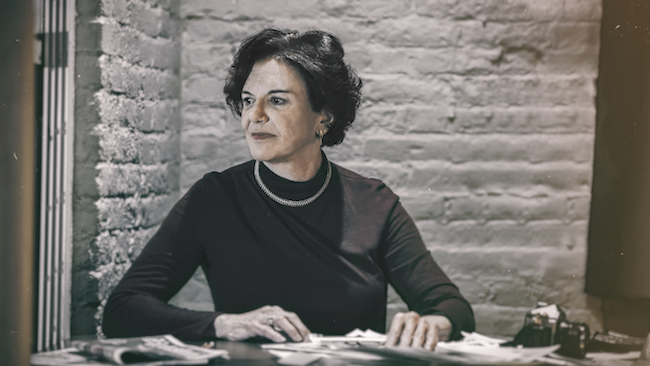Theater Review: “Really” — An Absorbing Confrontation With Memory
Company One’s production of this smart, unconventional work is absorbing: this is the kind of exciting theater that we need to see more often.
Really by Jackie Sibblies Drury. Directed by Shawn LaCount. Staged by Company One in partnership with Matter & Light Fine Art, at Matter & Light Fine Art, 63 Thayer Street SOWA, Boston, MA, through March 4.

Rachel Cognata as Girlfriend in the Company One production of “Really.” Photo Jeremy Fraga.
By Erik Nikander
When I heard that Company One’s New England premiere production of Really was being staged in an art gallery, I couldn’t help but feel a twinge of suspicion. If Matter & Light, the gallery in question, couldn’t accommodate the demands of the script or if Company One wasn’t able to work with the limitations of a space unaccustomed to staging plays, the end product could easily have come across as gimmicky or forced. Fortunately, the result turned out to be a near-perfect fusion; each company clearly understood the needs of the material, and it’s hard to imagine the play feeling this authentic in a traditional stage setting. That this reassuring symbiosis serves up a breathtaking production of a brilliant play only further sweetens the deal.
Jackie Sibblies Drury’s Really is a play about many things, but one of its major interests is memory. In fact, one of its three main characters, Calvin, is himself a memory. His death still looms large in the minds of his Girlfriend and his Mother, who meet for a tense photo session at Calvin’s old apartment. Surrounded by relics of his life and his work, the two women are forced to come to terms with each other and with the grief they’ve been forced to carry.
The exploration of these feelings is often messy and directionless, and only feels all the more real for it. When characters attempt to talk about their emotions, their explanations tend to go around in circles or simply come out as a jumbled mess. The Girlfriend, for instance, when asked to describe her new project to Mother, can only manage to say that she’s “…trying to do something with intimacy… about capturing the production of that space. Sort of. I mean I wouldn’t have described it like that but that’s what I’m doing.” Minimalist, stylized dialogue like this risks become irritating, but Drury knows just how much to leave to our imagination. Her scenes and exchanges are rich with repressed emotion, so even if the talk of the characters doesn’t make logical sense, there is plenty of compelling resonance.
Of course, the cast’s devotion to the material is a significant reason for why the play works so well. Kippy Goldfarb as Mother is especially riveting; that feat is all the more remarkable because, in the opening scenes when she’s alone with Girlfriend, the latter is virtually silent. Mother does just about all of the talking, and Goldfarb makes every line, gesture, and facial tic ring true. Her performance and Drury’s vivid dialogue mesh perfectly to create a character who’s both familiar and strange. Throughout the 75-minute runtime of the show, there’s not an instant when Goldfarb’s Mother comes off as unconvincing.
Rachel Cognata as Girlfriend is presented with more of a challenge, at least in terms of garnering the sympathies of audience members. The character’s obstinate silence and subtle facial expressions initially make her seem cold and distant. However, Girlfriend becomes increasingly fascinating; her hesitance to show emotion is obviously the ying to Mother’s more effusive yang. Girlfriend is a figure riddled with uncertainty. She’s earnest to a fault; she is determined to engage with political problems as well as find her artistic voice. Her relationship with Calvin has left her doubting that she can reach either goal. Mother responds with hostility to any suggestion that her son was less than the fine boy she remembers. It is this emotional gulf, which divides the two women, that Drury explores.

Kippy Goldfarb as Mother in the Company One production of “Really.” Photo: Jeremy Fraga.
The gap between the two women is personified on stage by Aleksandr Portenko, who deftly portrays both the aloof brilliance of the Calvin that Girlfriend knew and the stubborn child that lives on in Mother’s memory. Yes, the Calvin glimpsed at in the play is a composite of memories — not a real person — yet his emotional presence in the drama is crucial. Portenko conveys the photographer’s volatile contradictions, his combination of immaturity and wisdom, how his effortless confidence in his own talents driven by a childish anger. The play has the unfortunate habit of asserting Calvin’s artistic brilliance instead of showing it, but he remains an enigmatic and charismatic figure.
The gallery space of Matter & Light has been transformed into a sparse, cozy artist’s apartment (working sink included!). Lighting designer Jason Fok makes the memory sequences memorable via bursts of color springing into the space, while Lee Schuna’s evocative (and modulated) sound work draws the audience in.
I would highly recommend attending the post-show discussion: hearing the actors and dramaturgs talk so knowledgeably, and with such impressive depth, about the script will deepen your appreciation of Really, as well as the dedicated creative efforts that went into director Shawn LaCount’s absorbing production of this smart, unconventional work. This is the kind of exciting theater that we need to see more often.
Erik Nikander is a critic, playwright, and filmmaker based in the New England area. His film criticism can be read on Medium and his video reviews on a variety of topics can be viewed on Youtube at EWN Reviews.
Tagged: Company One, Erik Nikander, Jackie Sibblies Drury, Kippy Goldfarb, Matter & Light Fine Art gallery, Rachel Cognata
